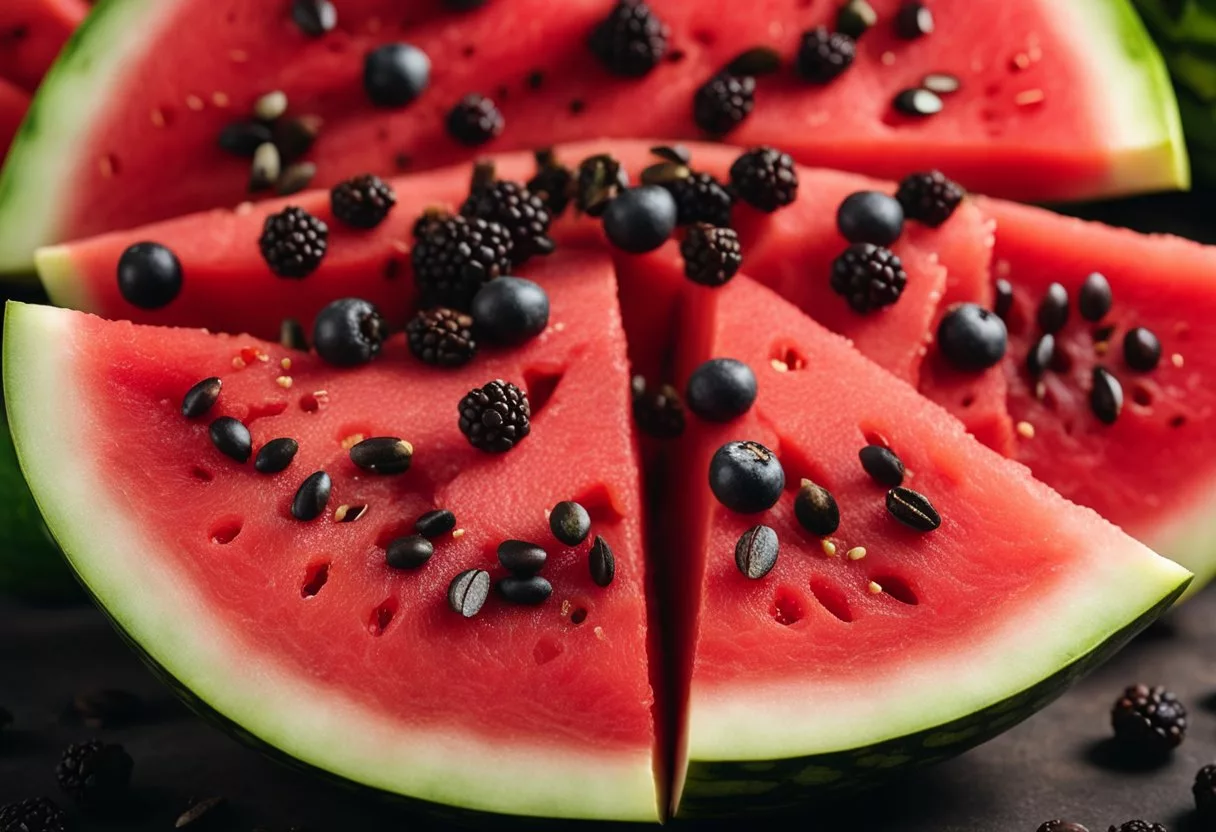Watermelon is a delicious and refreshing fruit that is perfect for hot summer days. Not only is it a tasty treat, but it also has numerous health benefits. In fact, eating watermelon every day can have a positive impact on your overall health.
Watermelon is a great source of hydration, as it is made up of 92% water. This means that eating watermelon can help keep you hydrated, which is important for maintaining healthy bodily functions. Additionally, watermelon is low in calories and high in nutrients, making it a great snack option for those looking to maintain a healthy diet.
Research has shown that eating watermelon every day can have numerous health benefits. For example, watermelon is rich in antioxidants, which can help protect your body against damage from harmful free radicals. Additionally, watermelon has been shown to have anti-inflammatory properties, which can help reduce inflammation throughout the body. Overall, incorporating watermelon into your daily diet can have a positive impact on your health and wellbeing.
Nutritional Profile of Watermelon

Watermelon is a refreshing and delicious fruit that is known for its high water content and sweet taste. It is also packed with essential nutrients that are beneficial for overall health. In this section, we will take a closer look at the nutritional profile of watermelon.
Vitamins and Minerals
Watermelon is a good source of several vitamins and minerals, including vitamin C, vitamin A, vitamin B6, potassium, and magnesium. Vitamin C is an antioxidant that helps protect cells from damage and supports a healthy immune system. Vitamin A is important for vision, skin health, and immune function. Vitamin B6 is essential for the metabolism of carbohydrates, proteins, and fats. Potassium is important for regulating blood pressure and maintaining proper fluid balance in the body. Magnesium is involved in many processes in the body, including energy production, muscle and nerve function, and bone health.
Hydration and Water Content
Watermelon is composed of about 92% water, which makes it an excellent choice for staying hydrated. Adequate hydration is important for many bodily functions, including regulating body temperature, transporting nutrients, and removing waste products. In addition to its high water content, watermelon also contains electrolytes like potassium, which help maintain proper fluid balance in the body.
Caloric and Sugar Content
Watermelon is a low-calorie fruit that is naturally sweet. One cup of diced watermelon contains only 46 calories and 9 grams of natural sugar. Watermelon also contains fiber, which helps slow down the absorption of sugar into the bloodstream and can help prevent blood sugar spikes.
In summary, watermelon is a nutritious and hydrating fruit that is low in calories and high in essential nutrients. Its high water content, electrolytes, and natural sugar make it a perfect summer snack for staying hydrated and healthy.
Health Benefits of Daily Consumption

Watermelon is a delicious and refreshing fruit that offers numerous health benefits when consumed daily. In this section, we will explore some of the most significant health benefits of daily watermelon consumption.
Cardiovascular Health
Watermelon is rich in lycopene, a powerful antioxidant that helps reduce the risk of heart disease by lowering LDL (bad) cholesterol levels and reducing inflammation in the arteries. Additionally, watermelon contains citrulline, an amino acid that helps improve blood flow and lower blood pressure, further contributing to cardiovascular health.
Antioxidant Effects and Cancer Prevention
Watermelon is a rich source of antioxidants, including vitamins A and C, which help protect the body against free radicals that can damage cells and lead to chronic diseases such as cancer. According to a study published in the Journal of Agricultural and Food Chemistry, watermelon contains more lycopene than any other fruit or vegetable, making it an excellent choice for cancer prevention.
Blood Pressure Regulation
Watermelon is a natural diuretic and contains potassium, a mineral that helps regulate blood pressure by counteracting the effects of sodium. A study published in the American Journal of Hypertension found that watermelon extract supplementation significantly reduced blood pressure in obese adults with hypertension.
Anti-Inflammatory Properties
Watermelon contains anti-inflammatory compounds such as cucurbitacin E and flavonoids that help reduce inflammation and alleviate muscle soreness after exercise. Additionally, watermelon is a rich source of collagen, a protein that helps maintain healthy skin and joints and reduces inflammation in the body.
Digestive Health
Watermelon is rich in fiber and water, making it an excellent food for promoting healthy digestion and preventing constipation. Additionally, watermelon contains electrolytes such as potassium and magnesium, which help maintain proper hydration and electrolyte balance in the body.
In summary, daily watermelon consumption can offer numerous health benefits, including improved cardiovascular health, cancer prevention, blood pressure regulation, anti-inflammatory properties, and digestive health. Incorporating watermelon into your daily diet can be an easy and delicious way to boost your overall health and well-being.
Potential Risks and Side Effects
Sugar Intake and Diabetes
Watermelon is a sweet fruit, and like all sweet fruits, it contains natural sugars. While these sugars are not harmful in moderation, excessive consumption of watermelon can lead to a spike in blood sugar levels. This can be a concern for people with diabetes or those at risk of developing diabetes. However, according to a Healthline article, “one study found that drinking watermelon juice for 12 weeks did not significantly affect blood sugar levels in people with diabetes.”
Digestive Concerns
Watermelon is a hydrating fruit that contains a lot of water, fiber, and other nutrients that promote digestive health. However, some people may experience digestive issues after eating watermelon. This can include gas, bloating, and diarrhea. These symptoms are usually mild and go away on their own, but they can be uncomfortable.
According to a Fitwirr article, “eating too much watermelon can lead to an upset stomach, especially if you have a sensitive digestive system or suffer from irritable bowel syndrome (IBS).” It’s important to listen to your body and consume watermelon in moderation to avoid these digestive concerns.
Allergic Reactions
While watermelon is a nutritious fruit, some people may be allergic to it. Allergic reactions to watermelon are rare, but they can be severe in some cases. According to a Medical News Today article, “people with oral allergy syndrome may experience symptoms such as itching, swelling, and tingling in the mouth and throat after eating watermelon.” In rare cases, watermelon can cause anaphylaxis, a severe and potentially life-threatening allergic reaction.
It’s important to note that the potential risks and side effects of eating watermelon are generally mild and rare. Most people can enjoy watermelon as part of a healthy and balanced diet without any issues. However, if you experience any concerning symptoms after eating watermelon, it’s important to talk to your doctor.
Influence on Physical Activity and Weight Management

Exercise Performance
Watermelon is a great source of citrulline, an amino acid that helps to reduce muscle soreness after exercise. According to a study published in the Journal of Agricultural and Food Chemistry, athletes who drank watermelon juice before exercise experienced less muscle soreness 24 hours after exercise than those who drank a placebo. The study suggests that watermelon juice may help improve exercise performance by reducing muscle soreness and improving recovery time.
Impact on Body Weight and Composition
Watermelon is a low-calorie food that is high in water content, making it a great addition to any weight loss or weight management plan. One cup of diced watermelon contains only 46 calories and is a good source of vitamin C, vitamin A, and potassium. Incorporating watermelon into a healthy diet can help reduce overall calorie intake, leading to weight loss.
In addition to its low-calorie content, watermelon may also have a positive impact on body weight and composition. A study published in the Journal of Nutritional Biochemistry found that mice fed a high-fat diet supplemented with watermelon juice had lower body weight, body mass index, and waist-to-hip ratio than mice fed a high-fat diet without watermelon juice supplementation. The study suggests that watermelon may have anti-obesity effects and could be a useful addition to a weight loss or weight management plan.
Overall, incorporating watermelon into a healthy diet and exercise routine can have positive effects on physical activity and weight management.
Considerations for Consumption

Recommended Intake and Moderation
Watermelon is a healthy fruit that can be consumed daily as part of a balanced diet. According to registered dietitians, a serving size of watermelon is about 2 cups diced or 10 mini watermelon wedges [1]. However, it is important to consume watermelon in moderation due to its high glycemic load [2]. Eating too much watermelon can cause a spike in blood sugar levels, which can be harmful to people with chronic diseases such as diabetes.
Selection and Storage
When selecting a watermelon, look for a uniform shape and a smooth, unblemished rind. Different varieties of watermelon have different colors and textures. The most common varieties are yellow, orange, and seedless [3]. To store a whole watermelon, keep it at room temperature for up to a week or in the refrigerator for up to two weeks. Once cut, store watermelon in an airtight container in the refrigerator for up to five days.
Varieties and Preparations
Watermelon can be consumed in many different ways, such as sliced, diced, or blended into juice. Watermelon juice is a refreshing drink that is easy to make at home. Simply blend watermelon chunks with ice and a squeeze of lime juice for a delicious and hydrating beverage. Watermelon seeds are also edible and are a good source of magnesium and other nutrients [4]. For a fun and healthy treat, try freezing watermelon chunks on a popsicle stick for a homemade watermelon popsicle.
In conclusion, watermelon is a delicious and healthy fruit that can be enjoyed in moderation as part of a balanced diet. By following these guidelines for selection, storage, and preparation, you can incorporate watermelon into your diet and reap its many health benefits.
Additional Nutritional Aspects

Role of Amino Acids in Health
Watermelon is a good source of amino acids, which are essential for the proper functioning of the body. Amino acids are the building blocks of protein, which is essential for the growth and repair of muscles, tissues, and organs. Watermelon contains the amino acids l-citrulline and arginine, which have been shown to have numerous health benefits. L-citrulline is converted into arginine in the body, which then increases the production of nitric oxide, a molecule that helps to relax and dilate blood vessels, thereby improving blood flow and reducing blood pressure. Arginine is also important for the immune system and hormone regulation.
FODMAP Content and Sensitivities
Watermelon is considered low FODMAP, which means it contains low levels of fermentable carbohydrates that can cause digestive discomfort in some people. However, some people may be sensitive to the natural sugars in watermelon and experience bloating, gas, or diarrhea after consuming it. If you experience any of these symptoms after eating watermelon, it may be best to limit your intake or avoid it altogether.
Minerals and Zinc
Watermelon is also a good source of several minerals, including potassium, magnesium, and calcium. These minerals are important for maintaining healthy bones, muscles, and nerves. Zinc is another important mineral found in watermelon, which plays a role in immune function, wound healing, and DNA synthesis.
In conclusion, watermelon is a nutritious fruit that provides several health benefits due to its amino acid content, low FODMAP levels, and mineral content. However, it is important to be aware of any sensitivities or allergies to watermelon and consume it in moderation as part of a balanced diet.
Specific Health Conditions and Watermelon

Impact on Heart Disease and Stroke
Watermelon is a great source of lycopene, a carotenoid that may reduce the risk of heart disease and stroke. According to a study published in the American Journal of Hypertension, watermelon extract supplementation reduced ankle blood pressure and brachial blood pressure in obese adults with hypertension. Additionally, watermelon contains citrulline, an amino acid that may help improve blood flow and lower blood pressure.
Skin and Eye Health
Watermelon is rich in beta-carotene, which the body converts to vitamin A. Vitamin A is essential for healthy skin and eyes. Additionally, watermelon contains cucurbitacin E, which has been shown to have anti-inflammatory effects and may help protect against age-related macular degeneration.
Immune Function and Healing
Watermelon is an excellent source of vitamin C, which is essential for immune function and wound healing. Vitamin C aids in the absorption of iron and helps carry oxygen to hair follicles. Watermelon also contains collagen, a type of protein that promotes youthful skin and hair.
In conclusion, watermelon is a nutrient-dense fruit that offers a variety of health benefits. Regular consumption of watermelon may help reduce the risk of heart disease and stroke, improve skin and eye health, and enhance immune function and healing. However, it is important to note that excessive consumption of watermelon may lead to stomach issues and raise blood sugar levels.